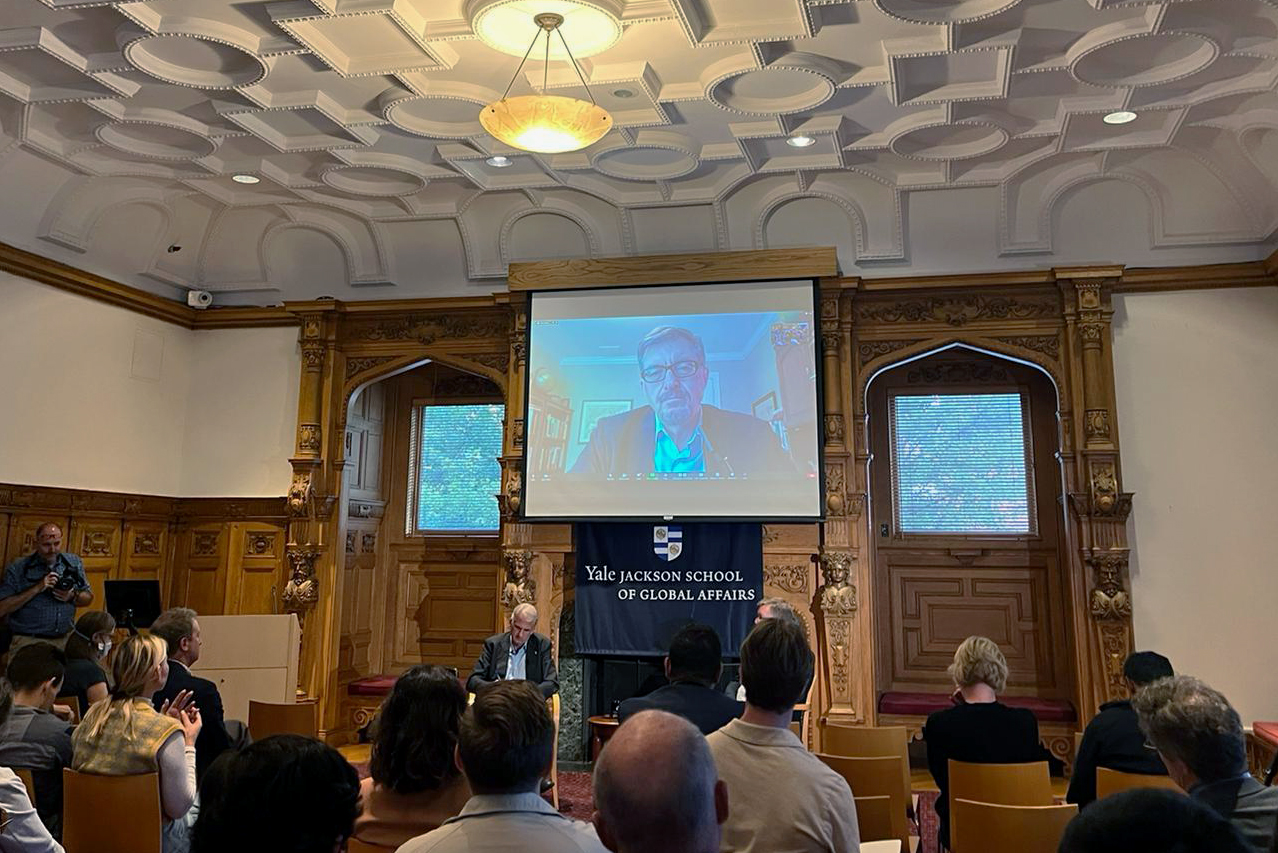Snyder urges long-term thinking on Ukraine
At a Wednesday talk held at the Jackson School of Global Affairs, professor of history Timothy Snyder and Harvard professor Serhii Plokhii discussed the implications of the war.

dnan Bseisu, Contributing Photographer
Seven months since Russia’s invasion of Ukraine in late February, Yale professors remain focused on the war’s global and historical implications.
On Wednesday, Sept. 28, the Jackson School of Global Affairs hosted a talk called “The War in Ukraine: Where do we go from here?” The discussion was facilitated by Arne Westad, a professor of history and global affairs and the director of international studies at the Jackson School. Professor of history Timothy Snyder and Serhii Plokhii, a professor of Ukrainian history at Harvard, joined Westad to discuss the long-term implications of the war on Ukraine, with a particular focus on China and the global order.
Snyder explained that the best way to influence Russia’s actions is to provide unwavering international support to Ukraine.
“For a quarter of a century, I’ve been trying to make the argument that the best Russia policy is a good Ukraine policy,” Snyder said at the talk. “Supporting Ukraine as a policy since February has done much more to influence the course of events in the Russian Federation than any American policy towards the Russian Federation since the end of the Cold War.”
Snyder also dwelled on the ripple effects of the war. He estimated that Ukraine’s Western-backed resistance to Russia has delayed a potential Chinese invasion of Taiwan by at least 10 years. He did, however, note that the war has increased Russia’s dependence on China significantly, bringing the two superpowers unprecedentedly close to each other.
Westad told the audience that it is important to have ongoing discussions about the war with experts like Snyder and Plokhii, especially as it evolves on a daily basis.
“[We’re] trying to get a handle on where we are and what has led us into the kind of situation that we are seeing at the moment and perhaps also what could eventually lead us out of it,” Westad said while introducing the talk. “We will of course come back to this topic again, hopefully when things have taken turns for the better.”
Nikita Mazotov ’26, an international student from Ukraine, said that he is grateful to the University for holding talks about Ukraine.
Mazotov said that by holding such talks, the University is helping to keep the focus of the news on Ukraine.
“The war in Ukraine is going to last longer if the Western World – the main allies of Ukraine – lose interest,” Mazotov said. “What needs to happen now is for the support which has been shown to Ukraine to continue. Yale, as a leading institution, may be a catalyst to that.”
Felipe Prates Tavares ’26, who attended the talk, said that he appreciated the opportunity to hear from historians about the war in Ukraine.
Tavares noted that he felt like he was getting insight into the thinking of leading experts on the war, who are likely to influence the way the US responds to it.
“The way Timothy Snyder and the other professors were talking about [the war], you can tell that they actually have an influence when it comes to the real policy that the US is employing towards Ukraine,” Tavares said. “They are important voices.”
Tavares was, however, surprised that the professors all seemed to accept that Russia will ultimately lose the war and that Russian president Vladimir Putin will be overthrown.
But, Snyder reminded the audience that all tyrannical regimes come to an end. History, he said, leads him to believe that Putin is no exception.
“When I talked to President Zelensky a couple of weeks ago, one of the interesting things he said is that everything is in Shakespeare,” Snyder said. “It is certainly true that the problem of tyranny is in Shakespeare. [Putin’s] in that situation where you’ve been in power too long, you have a wild idea of your own, you want to leave a legacy that’s going to last beyond your lifetime, you don’t listen and you can’t listen.”
Snyder urged the world to be prepared for Putin to reach his tragic Shakespearean end. He told the audience that one of the most embarrassing outcomes of Putin’s demise would be if the US were surprised by it.
Snyder also explained that he is optimistic that a regime change will be an opportunity for reform given Russian history.
“One can’t say that Russia will reform, but the only times that the Russian empire reformed … were after wars that they thought they would win but ended up losing,” Snyder said.
The Jackson School’s next scheduled event is an Oct. 4 talk, titled “Africa and the Russian Invasion of Ukraine: Challenges and Lessons for the Future.”







